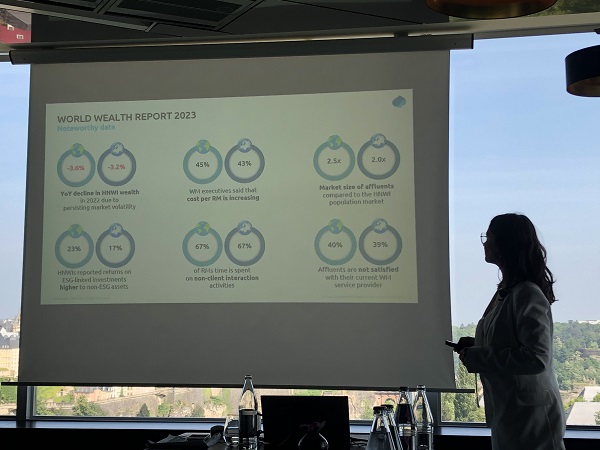 Martine Klutz, VP Head of Financial Services at Capgemini;
Credit: Otilia Dragan/Chronicle.lu
Martine Klutz, VP Head of Financial Services at Capgemini;
Credit: Otilia Dragan/Chronicle.lu
On Friday 2 June 2023, Capgemini held a press conference at Sofitel Luxembourg to present key findings from its latest World Wealth Report.
According to the 2023 report, the global high-net-worth individual (HNWI) population dropped by 3.3% to 21.7 million in 2022, while the value of its wealth decreased by 3.6% to $83 trillion. This marks the sharpest drop in a decade (2013-2022) and was reportedly triggered by geopolitical and macroeconomic uncertainty.
Capgemini spokespersons Martine Klutz, VP Head of Financial Services at Capgemini, and Kris Poté, VP Influencer Relations and Thought Leadership, revealed that the figures for Luxembourg were relatively stable, despite a decline of 0.7% in the overall HNWI population and a total wealth decline of 1.6% among all HNWI groups.
The HNWI population is composed of three tiers: the so-called millionaires next door ($1 to $5 million), the mid-tier millionaires ($5 to $30 million) and the ultra HNWIs (over $30 million). In Luxembourg, there were 41,810 millionaires next door recorded; their population showed a 0.6% decline with a 0.7% global wealth decline among this group. The mid-tier millionaires group, which reached 3,760 in the Grand-Duchy, showed a 1.7% population decline and a 1.8% wealth decrease. Lastly, the ultra HNWIs - 268 recorded in the country - showed a 2.9% population drop and a 3.8% wealth decrease. In total, there were 45,838 millionaires recorded in Luxembourg.
While North America registered the steepest wealth decline globally (7.4%), followed by Europe (3.2%) and Asia-Pacific (2.7%), Africa, Latin America and the Middle East registered financial growth and resilience in 2022 due to strong performances in the oil and gas sectors.
Kris Poté noted that, despite general high inflation, Luxembourg (and Belgium) showed a generally lower rate of inflation than other countries which may be due to COVID-19 government support offered for businesses such as hotels, restaurants and cafés. Martine Klutz hypothesised that wealth management firms in Luxembourg may have been particularly specialised and able to anticipate/predict potential changes in economic situations. She added that risk profiles may play a role in the situation as well, with Luxembourg individuals being potentially less risk-averse than other countries.
Moreover, according to the Capgemini Economic Review of 2022, in Luxembourg, the equity market capitalisation fell by 17.6% in 2022, compared to an increase of 18.7% in 2021. The National Savings Rate fell to 19.2% last year, and the real estate price growth slowed down to 1.8% in 2022 compared to a growth of 13% in 2021.
Both speakers pointed out that, with only three years since the COVID-19 crisis and because of the world’s generally unstable geopolitical environment, times are “uncertain” and the economic consequences have led to a record low since 2008.








